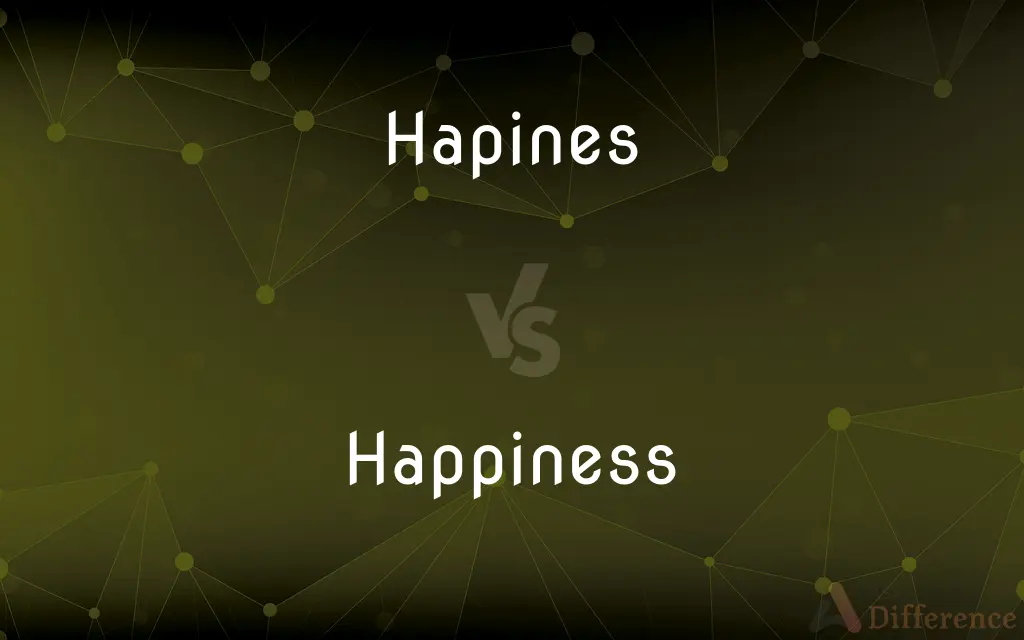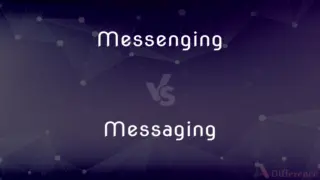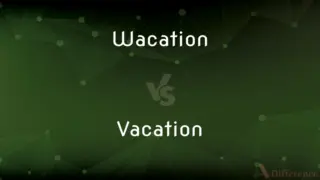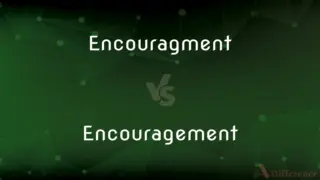Hapines vs. Happiness — Which is Correct Spelling?
By Tayyaba Rehman — Updated on March 31, 2024
"Hapines" is an incorrect spelling. The right term is "Happiness," denoting a state of well-being or joy.

Table of Contents
Which is correct: Hapines or Happiness
How to spell Happiness?

Hapines
Incorrect Spelling

Happiness
Correct Spelling
ADVERTISEMENT
Key Differences
Remember the double "p" like in "apple."
Recall that longer words like "happiness" often have repeated letters.
Associate with the phrase "twice as happy" to emphasize the two 'p's.
Think of "happiness" as being "full," hence needing the extra "p."
Recall "happy" as the base word; just add "-ness."
ADVERTISEMENT
How Do You Spell Happiness Correctly?
Incorrect: She found hapines in the simplest things in life.
Correct: She found happiness in the simplest things in life.
Incorrect: The secret to hapines is gratitude.
Correct: The secret to happiness is gratitude.
Incorrect: Money doesn't necessarily bring hapines.
Correct: Money doesn't necessarily bring happiness.
Incorrect: Finding hapines at work can increase productivity.
Correct: Finding happiness at work can increase productivity.
Incorrect: His main goal in life is to achieve hapines.
Correct: His main goal in life is to achieve happiness.
Happiness Definitions
A pleasurable or satisfying experience.
The birth of her child was a moment of sheer happiness.
The positive emotion opposite to sadness.
Sunshine often brings a sense of happiness.
An assessment of life satisfaction or quality.
Many seek the secret to lasting happiness.
A state of well-being, joy, or contentment.
His happiness was evident by his smile.
A favorable outcome or fortunate event.
The promotion was pure happiness for her.
The term happiness is used in the context of mental or emotional states, including positive or pleasant emotions ranging from contentment to intense joy. It is also used in the context of life satisfaction, subjective well-being, eudaimonia, flourishing and well-being.Since the 1960s, happiness research has been conducted in a wide variety of scientific disciplines, including gerontology, social psychology and positive psychology, clinical and medical research and happiness economics.
Enjoying, showing, or marked by pleasure, satisfaction, or joy
A happy child.
The happiest day of my life.
Cheerful; willing
Happy to help.
Characterized by good luck
A happy sequence of events.
Being especially well-adapted; felicitous
A happy turn of phrase.
Characterized by a spontaneous or obsessive inclination to use something. Often used in combination
Trigger-happy.
Enthusiastic about or involved with to a disproportionate degree. Often used in combination
Money-happy.
Clothes-happy.
(uncountable) The emotion of being happy; joy.
Prosperity, thriving, wellbeing.
Good luck; good fortune.
Fortuitous elegance; unstudied grace; — used especially of language.
Good luck; good fortune; prosperity.
All happiness bechance to thee in Milan!
An agreeable feeling or condition of the soul arising from good fortune or propitious happening of any kind; the possession of those circumstances or that state of being which is attended with enjoyment; the state of being happy; contentment; joyful satisfaction; felicity; blessedness.
Fortuitous elegance; unstudied grace; - used especially of language.
Some beauties yet no precepts can declare,For there's a happiness, as well as care.
O happiness! our being's end and aim!
Others in virtue place felicity,But virtue joined with riches and long life;In corporal pleasures he, and careless ease.
His overthrow heaped happiness upon him;For then, and not till then, he felt himself,And found the blessedness of being little.
State of well-being characterized by emotions ranging from contentment to intense joy
Emotions experienced when in a state of well-being
Happiness Meaning in a Sentence
Many people believe that happiness is more valuable than wealth.
The pursuit of happiness is a fundamental human goal.
Finding happiness in your job can lead to a more fulfilling life.
Exercise can contribute to overall happiness by releasing endorphins.
People find happiness in different things; what matters is what makes you happy.
Happiness often comes from spending time with loved ones.
Happiness can be found in both the big moments and the small pleasures of life.
Simple acts of kindness can bring immense happiness to others.
Happiness is not something ready-made. It comes from your own actions.
Happiness is not a destination, but a way of life.
True happiness often involves being content with what you have.
Happiness can spread from one person to another, much like a contagion.
Spending time in nature is a great way to boost your happiness.
Listening to music or engaging in creative activities can boost your happiness.
Physical health and happiness are closely linked.
A positive mindset can lead to higher levels of happiness.
Meditation and mindfulness can help increase feelings of happiness.
Volunteering and helping others can lead to profound happiness.
Studies show that gratitude can significantly increase your happiness.
Happiness in the workplace leads to greater creativity and productivity.
Cultivating strong friendships and relationships can enhance your happiness.
Traveling and experiencing new cultures can add to one’s happiness.
Laughing and finding humor in life can greatly contribute to one’s happiness.
Happiness doesn't come from achieving perfection but from loving the imperfect.
Happiness can come from overcoming challenges and growing as a person.
Common Curiosities
What is the verb form of Happiness?
The verb form is "happen," though contextually different, or "be happy."
Which vowel is used before Happiness?
The letter "a."
What is the pronunciation of Happiness?
It's pronounced as /ˈhæp.ɪ.nɪs/.
Which preposition is used with Happiness?
"of" as in "happiness of the heart."
Which conjunction is used with Happiness?
Any conjunction can be used depending on the context.
What is the singular form of Happiness?
"Happiness" is already singular.
Why is it called Happiness?
It's derived from the word "happy," indicating a state or feeling.
What is the root word of Happiness?
The root word is "happy."
What is the plural form of Happiness?
Happiness doesn't typically have a plural form; contexts like "different kinds of happiness" treat it as singular.
Which article is used with Happiness?
"The" is often used, e.g., "the happiness she felt."
Is Happiness a negative or positive word?
It's a positive word.
Is the word Happiness is imperative?
No, "happiness" is not imperative.
How many syllables are in Happiness?
Three syllables.
How do we divide Happiness into syllables?
Hap-pi-ness.
What is the opposite of Happiness?
Sadness.
Is Happiness an adverb?
No, it's not an adverb.
Is the Happiness term a metaphor?
No, but it can be used metaphorically in literature.
Is Happiness a noun or adjective?
"Happiness" is a noun.
Is Happiness an abstract noun?
Yes, because it represents a feeling or state not tangible.
Which determiner is used with Happiness?
"The," "some," and "much" can be used, e.g., "the happiness," "some happiness," "much happiness."
What is the third form of Happiness?
Not applicable, as it's primarily a noun.
Is Happiness a countable noun?
No, it's an uncountable noun.
Is Happiness a collective noun?
No, it's not a collective noun.
What part of speech is Happiness?
"Happiness" is a noun.
What is another term for Happiness?
Joy or contentment.
What is the first form of Happiness?
"Happiness" is primarily a noun and doesn't have verb forms.
How is Happiness used in a sentence?
"Happiness is not determined by what's happening around you, but rather what's happening inside you."
Is Happiness a vowel or consonant?
"Happiness" is a word containing both vowels and consonants.
What is a stressed syllable in Happiness?
The first syllable, "hap."
What is the second form of Happiness?
Not applicable, as it's primarily a noun.
Share Your Discovery

Previous Comparison
Pallate vs. Palate
Next Comparison
Messenging vs. MessagingAuthor Spotlight
Written by
Tayyaba RehmanTayyaba Rehman is a distinguished writer, currently serving as a primary contributor to askdifference.com. As a researcher in semantics and etymology, Tayyaba's passion for the complexity of languages and their distinctions has found a perfect home on the platform. Tayyaba delves into the intricacies of language, distinguishing between commonly confused words and phrases, thereby providing clarity for readers worldwide.













































